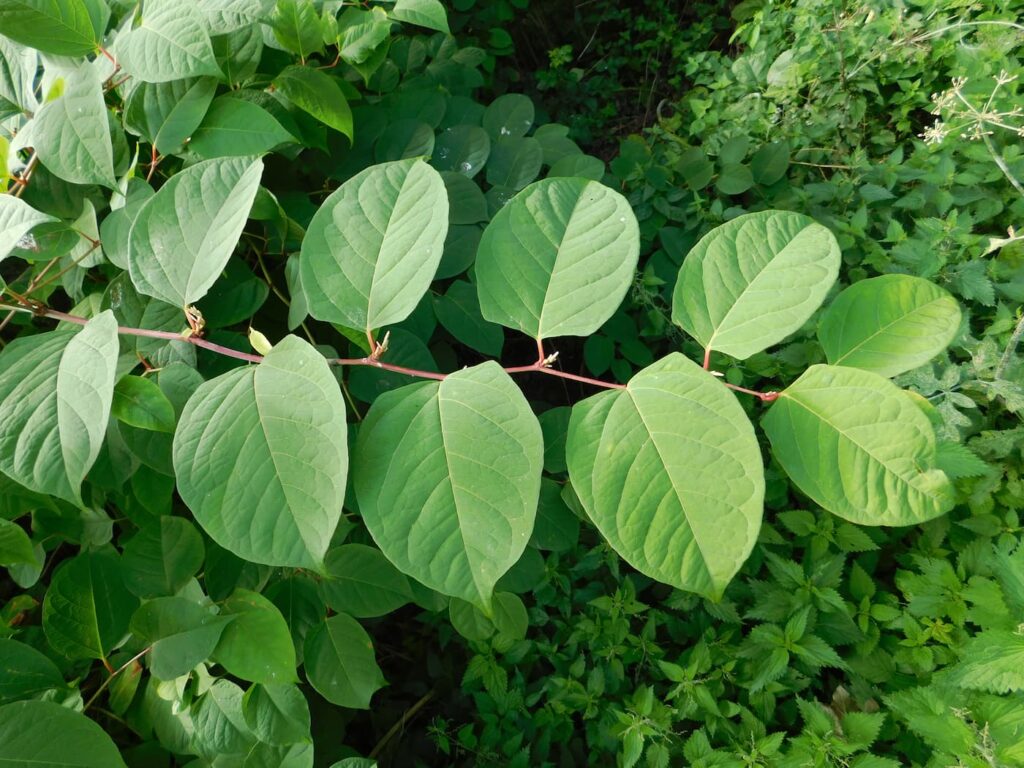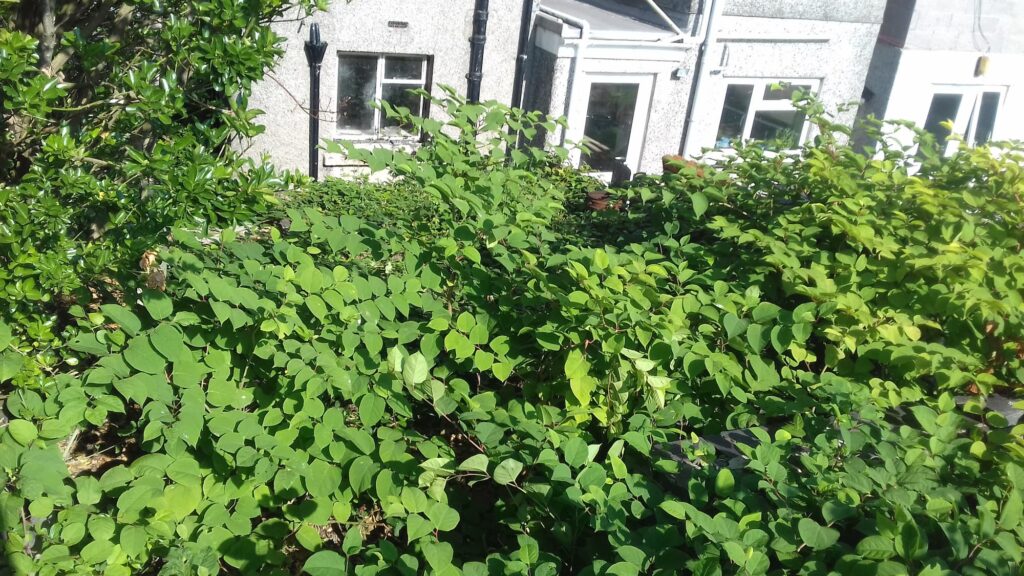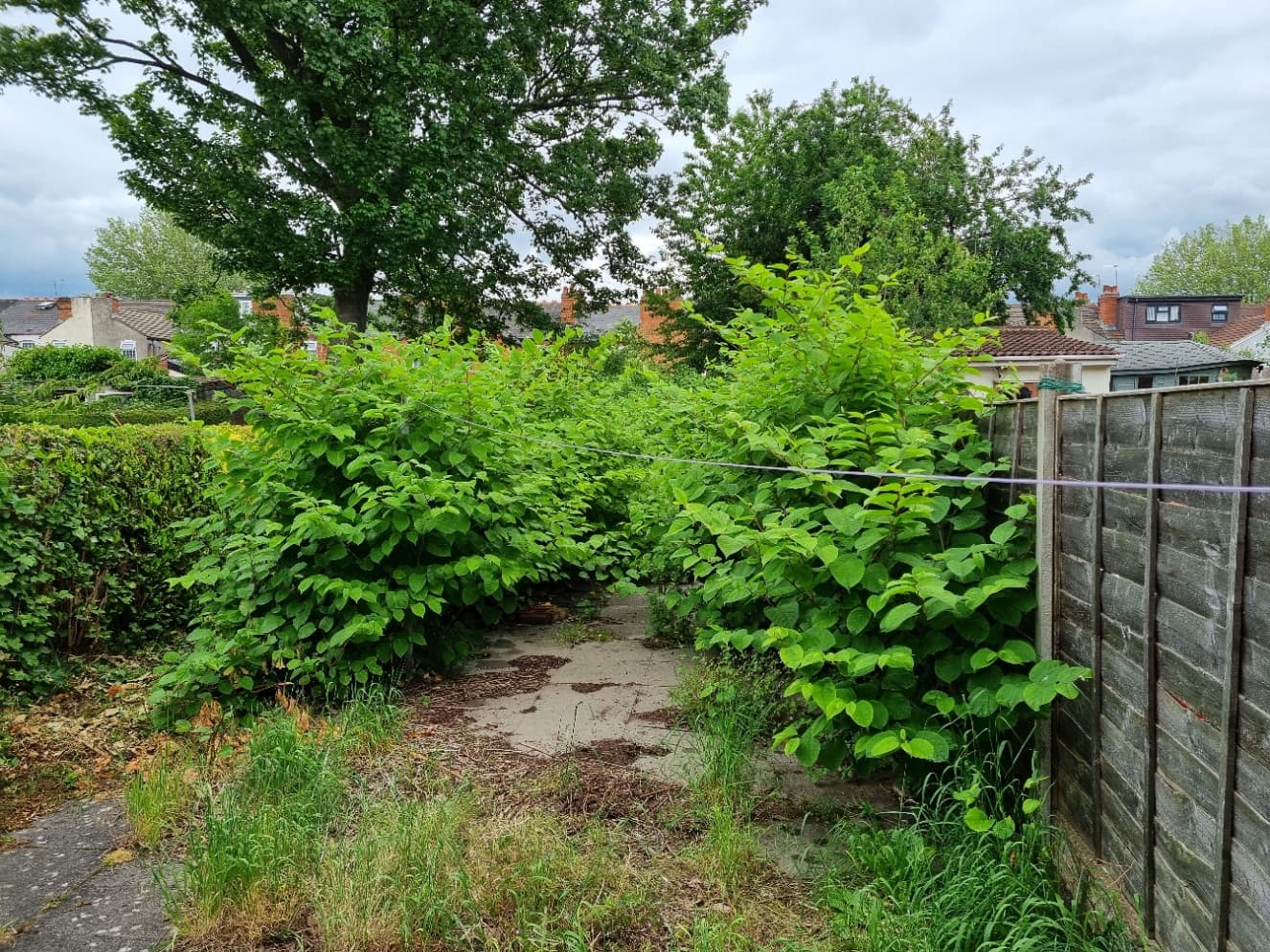Japanese knotweed, a name that strikes fear into the hearts of homeowners and property buyers alike. This seemingly innocuous plant, with its bamboo-like stems and heart-shaped leaves, has earned a notorious reputation as the UK’s most invasive and destructive plant species. It can wreak havoc on homes and buildings, potentially causing substantial damage and even deterring mortgage lenders from providing financial support.
Identifying Japanese knotweed can be a daunting task in itself. Its upward shoots with hollow stems resemble bamboo, while its leaves bear a striking resemblance to various other common plants, including dogwood. If you discover Japanese knotweed growing on your property, you must take immediate steps to control or remove it. Failure to do so could result in legal action if it spreads to neighbouring properties or wild areas.
What’s even more concerning is that if Japanese knotweed has damaged your property, your standard home insurance policy may not cover it. In such cases, you may require indemnity insurance as an additional layer of protection to safeguard your investment. In this blog, we will delve into why having the right home insurance policy that covers Japanese knotweed can potentially save you thousands in the long run.
What is Japanese Knotweed Indemnity Insurance?
Typically, most home or building insurance policies do not cover the costs associated with Japanese knotweed, except for possible legal expenses cover. So, if you are in the process of buying a property and have concerns about potential risks related to knotweed, it’s strongly advisable to consider Japanese knotweed indemnity insurance. This specialised insurance policy covers a range of critical expenses, including:
- The cost of a comprehensive Japanese knotweed survey.
- Expenses related to the treatment or removal of the plant.
- Costs incurred in repairing any damage caused by knotweed on the insured property.
- Legal expenses in the event of a claim made against you.
Moreover, some policies may include an insurance-backed guarantee, which serves as a low-cost, long-term insurance policy provided alongside the services of a Japanese knotweed removal company. This guarantee ensures that any regrowth will be treated free of charge during the guarantee period, even if the treatment company becomes insolvent.

It’s worth noting that virtually all major banks and mortgage lenders require a treatment program and an insurance-backed guarantee on a property infested with Japanese knotweed before they are willing to extend a mortgage. Therefore, if you have Japanese knotweed on your property, obtaining an insurance-backed guarantee is not just advisable – it’s essential.
How Can Japanese Knotweed Indemnity Insurance Support Your Property?
Since the government’s call for evidence on improving the home-buying process in 2017, industry-wide initiatives are being set up to collect up-front information for homebuyers. When you fill out the Law Society’s TA6 form, if you answer ‘No’ or ‘Not Known’ to the question about the presence of Japanese knotweed on your property, it can negatively impact the buyer and leave them vulnerable to future costs. However, this risk can be mitigated with a Japanese knotweed insurance indemnity policy, which addresses the uncertainty and provides cover for both the buyer and their mortgage lender.
These indemnity insurance policies are specifically designed for properties that are not known to be affected by Japanese knotweed. They offer protection against future infestations on the property. It’s crucial to understand that if you state on the T6 form that there is no known Japanese knotweed on your premises, and the plant is later detected, you could potentially be held liable or even sued.
What Does Japanese Knotweed Indemnity Insurance Cover?
Japanese knotweed indemnity insurance provides coverage for properties not known to be affected by Japanese knotweed. This coverage includes the following:
- The cost of a survey and a detailed report conducted by a specialist removal company.
- Expenses related to the treatment or eradication of knotweed throughout the duration of the insurance policy.
- The cost of repairing any damage caused by knotweed on the insured property.
- Legal fees in case a third party, such as a neighbour, makes a claim.
Typically, Japanese knotweed indemnity insurance offers coverage for homeowners for a period ranging from five to ten years and for the lender for the duration of the mortgage. Therefore, if you are a prospective buyer with concerns about the presence of knotweed on a property you intend to purchase, it’s wise to consider taking out an indemnity insurance policy. For any advice or insurance inquiries, it’s advisable to consult your conveyancing solicitor.
Is it Illegal to Have Japanese Knotweed on Your Property?
No, it’s not illegal to have Japanese knotweed in your garden or on your property. However, there are important restrictions and responsibilities associated with its presence. Japanese knotweed must be kept under control, which is often easier said than done, especially after a thorough garden clearance.
The real legal issues arise when Japanese knotweed spreads beyond your property’s boundaries or into the wild. If you are found spreading knotweed into the wild, you could face fines of up to £5,000 or imprisonment for up to two years. Furthermore, if you allow knotweed to encroach upon a neighbouring property, you could be served with a community protection notice, which can lead to legal consequences.
Does my Insurance Provider Need to Know About Japanese Knotweed?
You are not obligated to inform your insurance provider about the presence of Japanese knotweed on your property unless they specifically request this information. However, if your insurance provider asks about the presence of knotweed on your premises, it’s crucial to be honest and provide accurate information. Failing to disclose information about Japanese knotweed on your property could potentially invalidate your entire home insurance policy and lead to legal action against you.
Will my Insurance Premiums Go Up Because of Japanese Knotweed?
In most cases, your insurance premiums should not be directly affected by the presence of Japanese knotweed on your property. This is primarily because most standard home insurance policies do not cover the cost of its removal or the damage it may cause to buildings and solid structures, such as walls and outbuildings.
However, it’s important to emphasise that if your insurance provider directly inquires about the presence of Japanese knotweed on your property, you must provide an honest and accurate response. Your insurer will likely expect you to take proactive measures to control the plant to protect both your property and your neighbours’ properties. This is another reason why removing Japanese knotweed from your property is often the best course of action.

Can Japanese Knotweed Damage Property?
Yes, Japanese knotweed can cause significant damage to property. It has the remarkable ability to take over your garden, wreak havoc on structures, and even cause subsidence. Japanese knotweed can grow through the tiniest cracks in concrete and brick, leading to extensive and costly damage. Structures like garden walls, garages, outbuildings, drains, and conservatories are particularly vulnerable to knotweed damage.
In 2022, the Royal Institution of Chartered Surveyors (RICS) published new guidance that abolished its notorious seven-metre radius rule around Japanese knotweed. This rule had caused issues for those buying and selling homes and made lenders hesitant to offer mortgages. However, it’s essential to clarify that this new guidance does not mean that Japanese knotweed is any less of a risk. Instead, it focuses on the genuine problems that Japanese knotweed can cause.
The plant has a rapid growth rate of up to 10 cm per day during the growing season. If left unchecked, it can become incredibly intrusive, potentially growing through cracks in concrete, hard standings, and foundations, making your garden unusable and unenjoyable. Additionally, the increasing number of litigation claims related to knotweed and landowners is a cause for concern and is expected to continue rising.
Will My Home Insurance Policy Cover Japanese Knotweed Damage?
It is highly unlikely that your standard home insurance policy will cover damage caused by Japanese knotweed, especially if the damage has occurred gradually over time. As a result, if you are aware of knotweed on your premises, ignoring it is not a prudent course of action. In such cases, your insurance provider could argue that any damage caused by knotweed is due to your negligence and failure to take appropriate action to remove or control it.
Will Insurance Cover My Legal Expenses in the Case of Litigation Against Me?
Consider this scenario: your neighbour files a legal case against you for property damage caused by Japanese knotweed. In this situation, your home insurance policy may provide coverage for your legal costs. Legal insurance cover can typically be added to most home insurance policies as an optional extra, although some policies may include legal cover as a standard feature. The amount of legal cover can vary, ranging from £25,000 to £100,000 or more, depending on your policy.
What if I Find Japanese Knotweed on my Property?
The safest and most effective course of action to take if you find Japanese knotweed on your property is to hire a specialised Japanese knotweed removal specialist. These experts can eradicate the plant from your property or develop a comprehensive plan for its treatment and control. Attempting to deal with Japanese knotweed on your own can be a time-consuming and costly endeavour, with the risk of regrowth ever present, as the plant’s growth both above and below ground is relentless. This persistence can lead to more potential damage, making it all the more important to seek professional help.
In conclusion, Japanese knotweed is a plant that demands attention, awareness, and proactive measures to mitigate its potential risks and damages. While it may not be illegal to have Japanese knotweed on your property, failing to address it appropriately can lead to significant financial and legal consequences. Japanese knotweed indemnity insurance serves as a valuable tool in protecting your property and financial investments, offering coverage for surveys, treatments, repairs, and legal expenses. If you’re buying a property or already own one with Japanese knotweed concerns, consult with your conveyancing solicitor to explore the benefits of this specialised insurance.
As you consider the unique challenges posed by Japanese knotweed, remember that knowledge and action are your most potent weapons in safeguarding your property and financial well-being.
Resources
The Law Society – property transaction forms (including TA6)
https://www.lawsociety.org.uk/topics/property/transaction-forms
The Law Society – Upfront information for homebuyers
https://www.lawsociety.org.uk/topics/property/ta6-part-1-upfront-information-for-homebuyers
Home Owners Alliance
https://hoa.org.uk/advice/guides-for-homeowners/i-am-selling/ta6-form/
The Postcode Areas We Serve
Gloucester and Swindon
Birmingham and the Midlands
Bristol and the South West
Cardiff and South Wales










